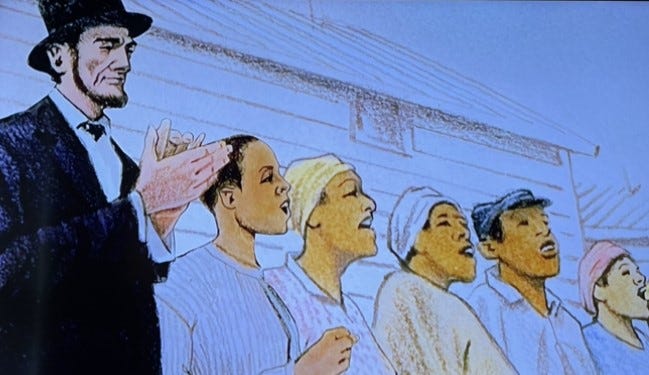Untold Stories: Abe Lincoln with the Former Slaves at the 'Contraband Camp'
“By their fruits you shall know them.” —Jesus Christ (Matt. 7:16)
There are so many inspiring, beautiful stories about the great heroes of American history which are scarcely ever told. One happens on them accidentally—buried in a thick, out-of-print biography, in small print on a museum sign, casually and fleetingly mentioned in an obscure educational video. America cannot return to greatness in the future if we do not truly understand the greatness of our past. That is why I am writing an article series to tell a few of these little-known but moving “untold stories” of American greatness.
“[Lincoln] was the first great man that I talked with in the United States freely, who in no single instance reminded me of the difference between himself and myself, of the difference of color, and I thought that all the more remarkable because he came from a State where there were black laws.” —Former slave and orator Frederick Douglass
The story for today is about the Great Emancipator, the Union’s savior during the critical crisis of the Civil War: Abraham Lincoln. There is so much about President Lincoln that has been largely lost in the history we are taught of him, but the tale I learned today at President Lincoln’s Cottage seemed to me to capture at once Lincoln the Emancipator and Lincoln the great man. It cast a vivid light on all that was best in Lincoln and on the most valuable part of his legacy to us.
The story is connected to Lincoln’s “retreat” away from Washington, D.C., a cottage near the Soldiers’ Home. Lincoln would live in the cottage and commute to and from D.C. during the hot months of the year (a more dangerous undertaking than one might guess—the war was sometimes close there and once Lincoln had his hat shot off). Lincoln would have passed by the “contraband camps,” or camps where former slaves were living, often in terrible conditions, after their escape from Confederate lands.
“The city of Washington was also a refuge for escaped slaves, and Lincoln visited some of the contraband camps where the fugitives lived. Early in the war, Union generals informally had established the policy that slaves who escaped to behind the Union Army lines would be considered ‘contraband of war,’ and would not be returned to their masters. (President Lincoln later made this a formal policy, although he initially opposed it.). . .The new arrivals joined a large community of free African Americans living in and around the city.”
Former slave and White House employee Mary Dines told a biographer of Lincoln that the president had stopped a number of times to talk to the residents of the “contraband camps.”
“Dines, called ‘Aunt Mary’ by the Lincolns, also occasionally worked as a cook at the White House. While laboring at the most famous home in America, she lived at a nearby contraband camp, and told Lincoln biographer John E. Washington that President Lincoln stopped to speak with refugees at a local camp many times on his way to the Soldiers’ Home.”
Dines also described two visits Lincoln made to the camps:
“[Lincoln twice visited] the contraband camp where she lived, which was located near the President’s route between the White House and the Soldiers’ Home. She reported that the President and Mrs. Lincoln, accompanied by a few guests, went to the camp to hear songs that the residents had prepared for them and seemed quite moved by the performance. The President returned for a more informal visit later and joined the residents in prayer and song.”
Dines described Lincoln’s reaction to “Negro spirituals.” The president “shed a tear mid-song.” Lincoln was not just legislating and running a war to help ensure the freedom of black Americans. Lincoln also took the time to meet and mingle with those same black Americans, to share their culture and reach out to them as one man to another. As Frederick Douglass said, nothing in Lincoln’s speech or interactions with Douglass indicated to the latter that he was “different” or “inferior.” Abe Lincoln saw past the external attribute of skin color to the men and women who shared the same humanity and the same country with him. Now that is greatness.
(Some information and the image for this article are courtesy of the President Lincoln’s Cottage museum.)




